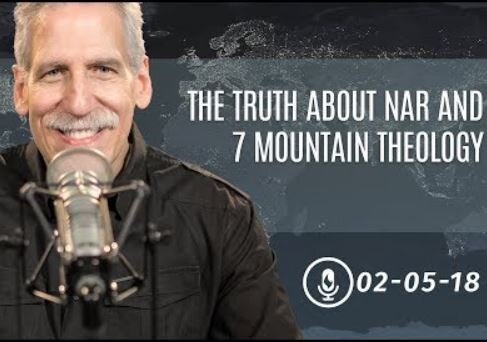My response to Michael Brown's claim that NAR doesn't exist
 For many years, very few people knew of the New Apostolic Reformation (NAR) by name, though they certainly were impacted by its teachings and practices. It's been encouraging to see more people become aware of this movement's existence and even to see the rise of a counter-movement challenging NAR.But in response to this counter-movement, some voices have risen defending the leaders of this movement. Some of those voices have gone so far as to deny that the New Apostolic Reformation even exists or, if it does exist, that it's as large and harmful as its critics, myself included, say it is. One of the strongest voices, in this regard, has been Michael Brown, author and radio host.During a recent podcast interview, Alisa Childers asked for my response to Brown's claims. You can read what I said below, starting at 29 minutes into the interview. The bottom line is that Brown hasn't clearly defined NAR. Nor does he seem to understand the essential thing that makes the NAR, NAR: i.e., the belief in the present-day governing offices of apostle and prophet. Because he doesn’t clearly define NAR, Brown errs in his conclusion that it doesn't exist, at least not to any significant degree. It seems that Brown just doesn’t know what he ought to be looking for.
For many years, very few people knew of the New Apostolic Reformation (NAR) by name, though they certainly were impacted by its teachings and practices. It's been encouraging to see more people become aware of this movement's existence and even to see the rise of a counter-movement challenging NAR.But in response to this counter-movement, some voices have risen defending the leaders of this movement. Some of those voices have gone so far as to deny that the New Apostolic Reformation even exists or, if it does exist, that it's as large and harmful as its critics, myself included, say it is. One of the strongest voices, in this regard, has been Michael Brown, author and radio host.During a recent podcast interview, Alisa Childers asked for my response to Brown's claims. You can read what I said below, starting at 29 minutes into the interview. The bottom line is that Brown hasn't clearly defined NAR. Nor does he seem to understand the essential thing that makes the NAR, NAR: i.e., the belief in the present-day governing offices of apostle and prophet. Because he doesn’t clearly define NAR, Brown errs in his conclusion that it doesn't exist, at least not to any significant degree. It seems that Brown just doesn’t know what he ought to be looking for.
The question
Alisa: I have to ask you about this. As I was preparing for this podcast and doing some research and just doing some of my own thinking, I started to see some tweets come down my news feed claiming that the NAR is not even a real thing, that it’s just a fabrication from really overly critical people. Specifically Michael Brown was tweeting a lot and even made a video basically claiming that NAR doesn’t exist. And so I have to ask you about that. So can you sum up what is Michael Brown saying and then how would you go about answering what he’s claiming?Holly: Sure. Well first, for those who don’t know, Michael Brown is a respected charismatic radio host and author. Commendably he has taken a strong biblical stand on moral issues like same-sex marriage.But lately, as you mentioned, he’s been dedicating his efforts to debunking criticisms of the New Apostolic Reformation and really been dismissing those who critique the NAR as conspiracy theorists. He keeps referring to the movement as the “so-called New Apostolic Reformation” and has described it in a recent show as a “bizarre false narrative about this worldwide conspiratorial NAR” saying “it’s just a myth.” And he said that he’s personal friends with many of the people who are identified as leaders in this movement -- such as Bill Johnson, Ché Ahn, and Mike Bickle -- and that they’ve never even heard of this movement so how could it be what the critics are saying it is?And so during a recent show he [Brown] did on the NAR he said some very good things, I have to say, about specific NAR teachings he disagrees with, such as the teaching that NAR revelation can supplement Scripture. He took a stand against that. And I’m glad he disagrees with those teachings.But the mistake he’s made, I think, in all of his recent shows and interviews about the NAR, is that I’ve never heard him give a clear, tight definition of what the NAR is. And because he hasn’t provided that clear definition, he hasn’t recognized that the leaders he defends are, in fact, a part of the NAR.And so it’s important that when people recognize what the NAR is – that it’s the belief in the present-day church offices of apostle and prophet, that those offices govern the church, then it becomes very clear that the NAR is a very large movement that’s been documented by church growth researchers and sociologists and so that’s the key thing to recognize. The defining belief of NAR that sets it apart from Protestant Christians throughout church history, including classical Pentecostals and charismatics, is the belief in these present-day governing offices.So, once that’s recognized, all you have to do is go to the website of Bethel Church in Redding, California – Bill Johnson’s church – and read their statement that their church embraces the biblical government of apostles and prophets. Or read Bill Johnson’s writings, including the article "Apostolic Teams -- A Group of People Who Carry the Family Mission."As far as Ché Ahn goes, he’s chancellor of Wagner University, which was founded by C. Peter Wagner. It’s described itself as a school to raise up leaders for the New Apostolic Reformation. And you can go on their website right now and see that they offer courses on the New Apostolic Reformation and training people to be apostles. Ché Ahn also governs a very large apostolic network of over 25,000 churches and ministries that have come under his apostolic authority, and people can just go to his website, Harvest International Ministry, and look at that network.Mike Bickle, who Michael Brown has also defended, through the years he [Bickle] has taught that the offices of apostle and prophet are [for] today, that they’re being restored for the end time, and that they have an essential role in the unfolding of God’s end-time plans for Earth. He’s talked about these offices in his very popular book Growing in the Prophetic. He, himself, has claimed that Jesus told him, during a visit he took to heaven, that if he was faithful he’d be among a group of 35 imminent apostles, governing apostles to rise up in the last days.So just a little bit of research will show that all these guys embrace the idea that apostles and prophets are to govern the church today. And I really want to stress that that teaching is very distinctive through church history, that there are governing apostles and prophets for today. So that’s how I’d respond to some of the claims he’s making.
----------
Holly Pivec is the co-author of A New Apostolic Reformation?: A Biblical Response to a Worldwide Movement and God's Super-Apostles: Encountering the Worldwide Prophets and Apostles Movement. She has a master's degree in Christian apologetics from Biola University.
